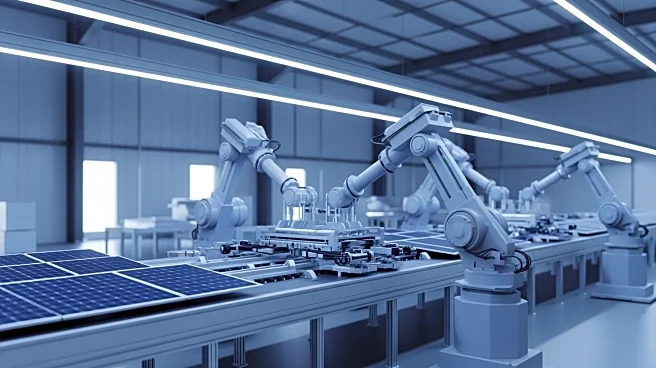What's Happening?
Beyond Gravity, a European parts manufacturer, has significantly expanded its solar array drive mechanism production facility in Zurich, increasing its annual production capacity from 36 to 200 units.
This expansion is in response to the growing demand for proliferated satellite constellations, which require efficient solar power solutions. The company is also considering expanding its facility in Florida if demand continues to rise. Beyond Gravity's mechanisms are crucial for aligning satellites' solar arrays to optimize solar power production, thereby enhancing spacecraft power supply efficiency. The company is developing a next-generation two-axis drive mechanism to further increase energy yield for high-power missions.
Why It's Important?
The expansion by Beyond Gravity reflects a broader shift in the satellite industry towards serialized production and increased demand for low Earth orbit (LEO) constellations. This trend is driven by the need for more efficient and cost-effective satellite solutions, which can lead to shorter satellite lifespans and increased demand for replacements. The company's investment in production capacity is part of a larger movement within the European space manufacturing ecosystem to capitalize on this demand, potentially leading to cost reductions and increased market competitiveness. This development is significant for the U.S. as it highlights the competitive landscape in the global satellite industry, which could impact American satellite manufacturers and operators.
What's Next?
Beyond Gravity's expansion may prompt other manufacturers to increase their production capacities to meet the growing demand for satellite constellations. As the space race intensifies, European independence in satellite technology could challenge U.S. dominance in the sector. The company's next-generation drive mechanism could set new standards for satellite efficiency, influencing future satellite designs and missions. Stakeholders in the U.S. satellite industry may need to adapt to these changes by investing in similar technologies or forming partnerships with European manufacturers to maintain competitiveness.
Beyond the Headlines
The shift towards serialized production and shorter satellite lifespans could have long-term implications for the satellite industry, including increased environmental concerns due to more frequent satellite launches and replacements. Ethical considerations regarding space debris and sustainability may become more prominent as the industry grows. Additionally, the focus on European independence in satellite technology could lead to geopolitical shifts in space exploration and collaboration.











